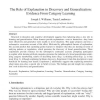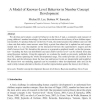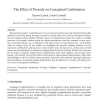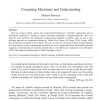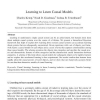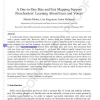COGSCI
2010
13 years 11 months ago
2010
Research in education and cognitive development suggests that explaining plays a key role in learning and generalization: When learners provide explanations--even to themselves--t...
COGSCI
2010
13 years 11 months ago
2010
many abstract categories (e.g., ``equivalence'') is innate. Although Plato argued with his contemporaries who advocated the empirical basis of knowledge, it was the Briti...
COGSCI
2010
13 years 11 months ago
2010
We develop and evaluate a model of behavior on the Give-N task, a commonly used measure of young children's number knowledge. Our model uses the knower-level theory of how ch...
COGSCI
2010
13 years 11 months ago
2010
This paper compares two explanations of the process by which human communication systems evolve: iterated learning and social collaboration. It then reports an experiment testing ...
COGSCI
2010
13 years 11 months ago
2010
Research into people's comprehension of novel noun-noun phrases has long neglected the possible influences of prosody during meaning construction. At the same time, work in c...
COGSCI
2010
13 years 11 months ago
2010
Recent research suggests that language evolution is a process of cultural change, in which linguistic structures are shaped through repeated cycles of learning and use by domain-g...
COGSCI
2010
13 years 11 months ago
2010
COGSCI
2010
13 years 11 months ago
2010
Learning to understand a single causal system can be an achievement, but humans must learn about multiple causal systems over the course of a lifetime. We present a hierarchical B...
COGSCI
2010
13 years 11 months ago
2010
A multi-modal person representation contains information about what a person looks like and what a person sounds like. However, little is known about how children form these face-...
COGSCI
2010
13 years 11 months ago
2010
Abecassis, Sera, Yonas, and Schwade (2001) have shown that young children represent shapes more metrically, and perhaps more holistically, than do older children and adults. How d...
